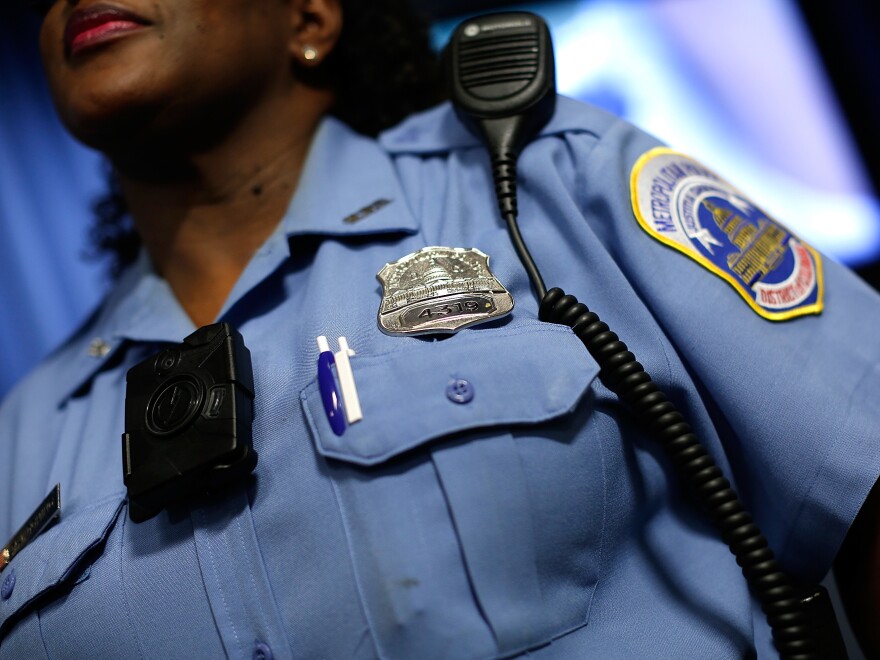New York City is set to begin giving body cameras to its police officers on Thursday.
Under the police department's pilot program, 1,200 officers in 20 precincts will receive the cameras. The officers will also be studied by scientists to see what effect the cameras have on policing.
As police don body cameras across the country, scientists are increasingly working with departments to figure out how the cameras change behavior — of officers and the public.
"Is the camera having an impact on the way officers use force? Is it reducing the number of citizens' complaints? Is it having a negative impact? All of those types of things I would like to know about these cameras," says Peter Newsham, the chief of police in Washington, D.C., where a similar study is just weeks from providing its first answers.
When officials in D.C. decided to deploy cameras a few years ago, the city happened to have a bunch of researchers who were just waiting to do a big, well-controlled study.
The researchers designed a field experiment to systematically compare cops wearing cameras to officers without cameras in one police force, in a major American city.
"We are a newer scientific team," says David Yokum, who works in the D.C. mayor's office. "We've got about 15 folks right now — Ph.D.s in psychology, economics, statistics, and so forth." Yokum directs the The Lab @ DC, which is an effort to bring the scientific method to government. Studying body-worn cameras is one of the lab's first projects.
"It's a massively important social issue," Yokum says. "Cameras are spreading across the country at a very rapid rate."
A recent nationwide survey found that 95 percent of police departments either have a body-worn camera program or plan to implement one. All of this is happening despite a real dearth of data on how those cameras will change policing.
"Technologies tend to always have intended and unintended effects and consequences," says Cynthia Lum, a criminologist at George Mason University.
She's reviewed studies of body-worn cameras and found about 40, but says that research offered no definitive answers. "We're just scratching at the surface to understand what the impacts of body-worn cameras are, either on the police or the people that they serve," Lum says.
For example, one widely cited study done in Rialto, Calif., suggested that cameras dramatically reduced police officers' use of force.
But a different study, published last May, found the story is much more complicated.
"When officers had more discretion as to whether they turn on and off their cameras," Lum explains, "this could potentially lead to increases in use of force."
In Washington, D.C., police officials let the researchers tell them exactly how to hand out the cameras to do the most rigorous study possible; as a result, not every officer got a camera right away.
"At any given period of time, people were randomly assigned to be either receiving the cameras or not," Yokum says.
What makes the D.C. study especially powerful is that it's one of the biggest police departments in the country.
"There's a lot of officers involved," Yokum says. "We're collecting a lot of data with 1,100 different cameras out on the street, and then 1,100 officers that don't have cameras. And so, just the numbers here are very large."
Previous studies have generally been done with smaller police departments, says Anita Ravishankar, one of the researchers on the science team.
What's more, she adds, the D.C. police department allowed researchers to gather data over seven months — a long timeline. Gradually, more officers got the cameras and now almost the entire force is wearing them.
"This was a big thing for the department to be willing to do and a huge deal for us to be able to do the study well and correctly," Ravishankar says.
Their group will be analyzing their data to look at the cameras' potential impact on a slew of things including use of force, citizen complaints, assaults against officers, and rates of convictions and plea bargains. They hope to have findings that they can make public in the coming weeks.
The New York Police Department will take the next year to compare the cops in its pilot program to officers without cameras.
In D.C., some officers say the cameras have an overall positive effect.
"I was hesitant in wearing it in the beginning," says Charles Monk, an officer in the Metropolitan Police Department's First District. But as he interacted with the public, his attitude changed.
"It changes people's personalities when they see you wearing it," he says. "I have to be very professional. And in return, the citizen — they're very professional."
And no matter what this study ultimately shows about the cameras, one thing seems already clear, Monk says: "They're here to stay."
Copyright 2021 NPR. To see more, visit https://www.npr.org.







